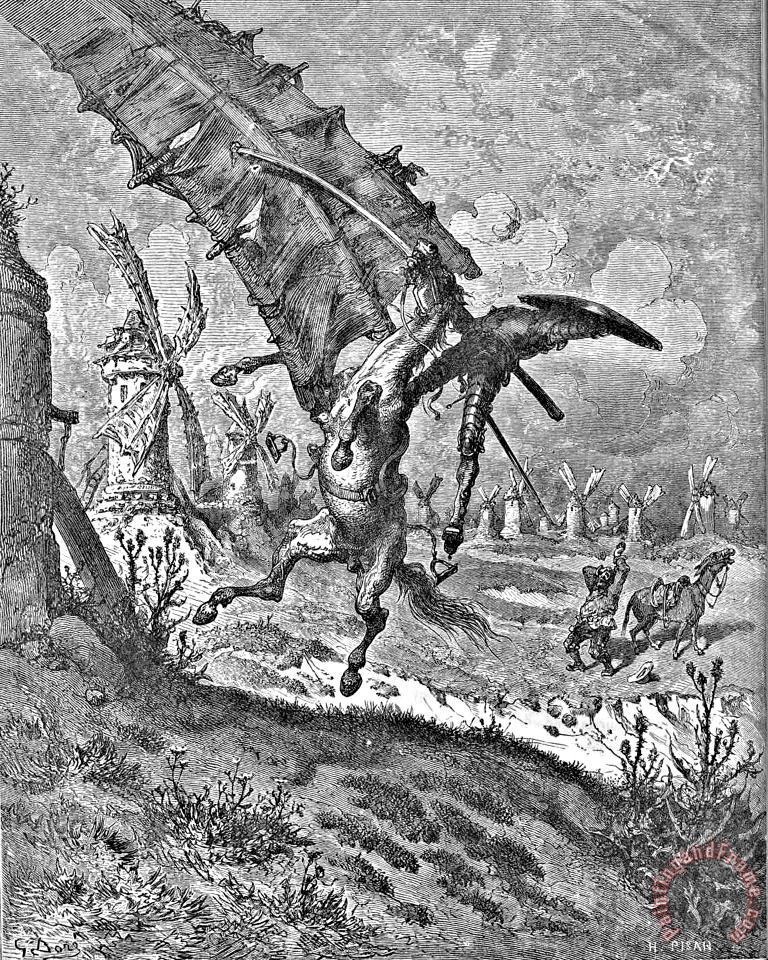
Friday
Certain people think they can bend reality to their will through positive thinking. The world’s top tennis player recently thought he could emerge unscathed from a tennis tournament he organized, complete with cheering crowds and no social distancing. (Djokovic, his wife, and several tennis professionals have since come down with the coronavirus.) Donald Trump thinks the virus will go away if America opens up business as usual and if he holds rallies that ignore it.
I was talking with my English professor son about literary characters who are similarly delusional, and he pointed out the obvious one: Cervantes’s Don Quixote. Despite the similarities, however, there’s a major difference that warrants comment.
Quixote is a Spanish nobleman who wants to make feudal Spain great again. Unfortunately, reality has other plans. Advanced power technology, in the form of windmills, is invading the landscape, and, thanks to Guttenberg, mass-produced books are replacing his beloved hand-printed volumes. Chivalry appears dead.
Rather than adapting to the change, he declares war on modernity, tilting with the windmills and declaring Dulcinea to be his lady fair. Time and again he insists that reality is other than what it is and finds himself knocked about as a result.
In the metafictional second volume, characters who have read the first volume are indulging Quixote’s fantasies in order to entertain themselves. I think of various billionaires who allow Trump to engage in his various racist shenanigans as long as he delivers tax cuts and rightwing judges. So long as they themselves are not hurt, why not allow him to play his little games?
When the Obama-Trump economy was humming along, Trump could escape the consequences of government failure. With 120,000+ dead and unemployment rising, however, reality has come knocking. Although I don’t expect Trump ever to admit error, I could imagine at least a few Republicans rejecting their Trumpist fantasies as the dying Quixote rejects his books of chivalry:
My reason is now free and clear, rid of the dark shadows of ignorance that my unhappy constant study of those detestable books of chivalry cast over it. Now I see through their absurdities and deceptions, and it only grieves me that this destruction of my illusions has come so late that it leaves me no time to make some amends by reading other books that might be a light to my soul.
Tom Spaccarelli, a friend and former member of Sewanee’s Spanish Department, points out an important contrast between Quixote and Trump. Quixote’s fantasies are driven by kindness and concern for others, not by a need to dominate. There’s no room for white supremacy in the pastoral Golden Age that he describes to a group of shepherds:
Happy the age, happy the time, to which the ancients gave the name of golden, not because in that fortunate age the gold so coveted in this our iron one was gained without toil, but because they that lived in it knew not the two words “mine” and “thine”! In that blessed age all things were in common; to win the daily food no labor was required of any save to stretch forth his hand and gather it from the sturdy oaks that stood generously inviting him with their sweet ripe fruit. The clear streams and running brooks yielded their savory limpid waters in noble abundance. The busy and sagacious bees fixed their republic in the clefts of the rocks and hollows of the trees, offering without usance the plenteous produce of their fragrant toil to every hand. The mighty cork trees, unenforced save of their own courtesy, shed the broad light bark that served at first to roof the houses supported by rude stakes, a protection against the inclemency of heaven alone. Then all was peace, all friendship, all concord; as yet the dull share of the crooked plough had not dared to rend and pierce the tender bowels of our first mother that without compulsion yielded from every portion of her broad fertile bosom all that could satisfy, sustain, and delight the children that then possessed her. Then was it that the innocent and fair young shepherdess roamed from vale to vale and hill to hill, with flowing locks, and no more garments than were needful modestly to cover what modesty seeks and ever sought to hide. Nor were their ornaments like those in use to-day, set off by Tyrian purple, and silk tortured in endless fashions, but the wreathed leaves of the green dock and ivy, wherewith they went as bravely and becomingly decked as our Court dames with all the rare and far-fetched artifices that idle curiosity has taught them. Then the love-thoughts of the heart clothed themselves simply and naturally as the heart conceived them, nor sought to commend themselves by forced and rambling verbiage. Fraud, deceit, or malice had then not yet mingled with truth and sincerity. Justice held her ground, undisturbed and unassailed by the efforts of favor and of interest, that now so much impair, pervert, and beset her. Arbitrary law had not yet established itself in the mind of the judge, for then there was no cause to judge and no one to be judged. Maidens and modesty, as I have said, wandered at will alone and unattended, without fear of insult from lawlessness or libertine assault, and if they were undone it was of their own will and pleasure.
Quixote concludes that his knightly duty is to “defend maidens, to protect widows and to succor the orphans and the needy.”
Misguided though Quixote is, how can we not applaud such a mission statement? Now imagine having a president who sees it, as his first duty, to serve and protect the American people.